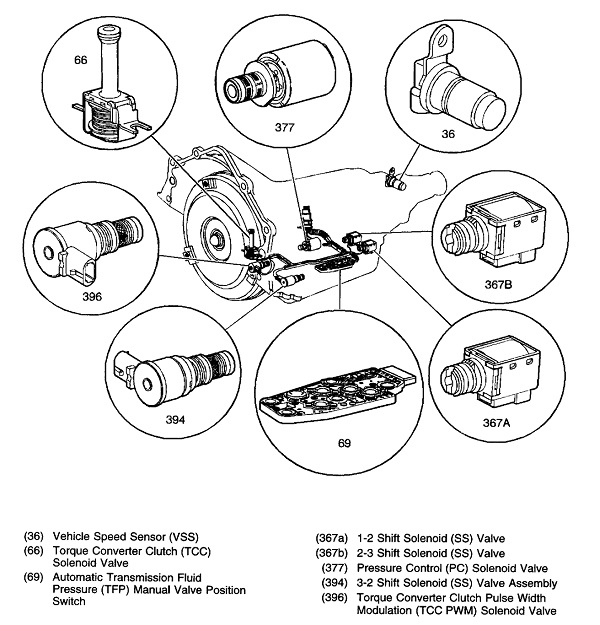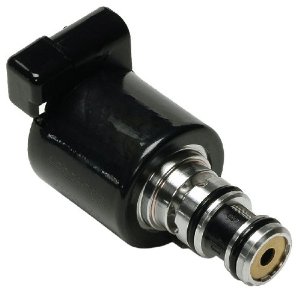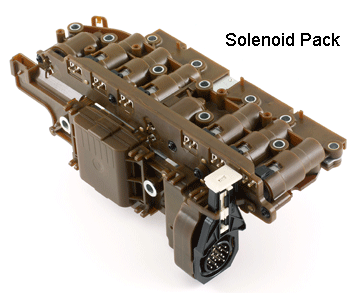Modern automatic transmissions use pressurized hydraulic fluid to change gears. Every time a gear change is required, the car’s computer activates a transmission solenoid, which directs transmission fluid into the valve body to engage the correct gear. If one of these electro-mechanical valves fail, then all sorts of transmission problems can ensue. So let’s take a closer look at the shift solenoid, and the common problems associated with it.
What Transmission Do I Have?

How Does a Transmission Solenoid Work?
As you’re going down the road, the car’s computer analyzes data being sent by vehicle speed sensors and engine speed sensors. Based on this information, the Engine Control Unit (ECU), or the Transmission Control Unit (TCM), executes the appropriate upshift / downshift by sending a signal to one of several shift solenoids. These transmission solenoids have a spring-loaded plunger inside, which are wrapped with wire. When this coil of wire receives an electrical charge from the TCM / ECU, it causes the plunger to open, allowing transmission fluid to flow into the valve body and pressurize the desired clutches and bands. When this happens, the transmission changes gears and you continue down the road.
The car’s computer can control the transmission solenoid in several ways. If the vehicle is equipped with a dedicated Transmission Control Unit, it can open or close the hydraulic circuit using a direct 12v signal. Or, the Engine Control Unit can control the solenoid’s plunger by turning the ground circuit on and off. A solenoid can be used to control a single gear or multiple gears, depending upon the complexity of the design.

Symptoms of a Transmission Solenoid Problem
 A transmission solenoid can fail due to electrical issues, or dirty fluid that’s caused the shift solenoid to become stuck open / closed. Any change in the transmission fluid pressure can cause numerous problems, including:
A transmission solenoid can fail due to electrical issues, or dirty fluid that’s caused the shift solenoid to become stuck open / closed. Any change in the transmission fluid pressure can cause numerous problems, including:
Erratic Shifting – If you’re dealing with a failed transmission solenoid, the gearbox can skip a gear up or down, shift back and forth between gears repeatedly, or get stuck in a gear and refuse to shift.
Transmission Won’t Downshift – If the transmission will not downshift, one of the shift solenoids may have become stuck open / closed, preventing fluid from entering the transmission valve body to pressurize the correct gear.
Severe Shifting Delay / Stuck in Neutral – In order for an electronically controlled automatic transmission to shift gears, the solenoid must be able to regulate the fluid pressure to activate the appropriate gear. If the shift solenoid is receiving too much or too little electric current, or dirty transmission fluid has caused it to become stuck open / closed, gear engagement maybe become difficult or delayed, which can cause the transmission to act as if it is temporarily locked in neutral.
Because the solenoids are connected to a vehicle’s electrical system, the ECU will usually register an error code and trigger the check engine light if something goes wrong. If this happens, the transmission can go into limp / fail mode, where it will only engage second / third gear to limit the vehicle speed without immobilizing it.
The first thing that your mechanic should look at are the error codes. Using a scan tool, the technician can determine the source of the solenoid’s problem. It could be as simple as a bad ground, or as complex as a failed solenoid pack (a grouping of individual shift solenoids).
Transmission Solenoid Replacement Cost – Parts & Labor
In most cases, solenoids are located inside of the oil pan, connected to the valve body. Depending on what you drive, the technician may be able to replace just the failed shift solenoid. However in some cases, the solenoids come in these multiple unit packs so if there is a problem with one, the entire pack must be replaced. This job typically takes 2-4 hours to complete, and shop time is generally billed at $60 – $100 per hour. The average total cost to diagnose and replace one ranges between $150 and $400.
Depending on the make and model of your vehicle, expect to pay between $15 – $100 for a single transmission shift solenoid. A pack can cost $50 to $300.
| Type | Cost Range |
|---|---|
| Single | $15 to $100 |
| Pack | $50 to $300 |
| Labor | $120 to $400 |
| Total (Pack) | $250 to $600 |

Although it isn’t unusual for transmission shift solenoids to wear out over time, you can extend their life by changing your transmission fluid at the factory recommended intervals. This will clean out all of the dirt and sludge that builds up, and the fresh fluid will keep the plungers on the inside of the solenoids from sticking. If you don’t know what your vehicle’s recommended transmission service intervals are, check the back of your owner’s manual, or simply ask Google.
Get a great deal on a replacement solenoid – for as low as $11 on Amazon <

I was replacing the shift silinoid. In my 2000 Nissan xterra the springs came out and I need to know where and to place them back in
I have a 2001 Chevy Blazer. it will not go into reverse. All other gears are finne
My 2008 Chevy Silverado 5.3 motor does not shift into reverse or drive it doesn’t move once it’s done drive or reverse
it runs ok when driving around come up on a stop light to slow down and you go to speed up it kicks hard
It seam s to run ok but when I slow down to go around a round about and then step on the foot fead it will kick
Mustang GT 1996 with 97,547 original miles. Couple a days ago when I turn on the car from parking to drive start having several seconds delay between them, then when I’m driving apparently it’s normal but when apply breaks and car it’s like that for couple a minutes same thing happens again. If this could help you it don’t slip between other gears and do not lose power mean while I’m accelerating the car responds normally. I want to fix it but I need some professional advice just find your services page and I’m interesting on the service. PS Also on shift stick when you see make the changes it’s not like before it’s not making changes on letter gears makes it between them. Automatic transmission you know what I mean when I said that. Thanks for time and future service.
I have a 2007 Chevy Tahoe when you put it in gear it acts like is on on and then you put a neutral rocket back and forth and disengage something and then it fine what is that called how can I fix it
my car 2015 ford escape it wont go higher to accelerate. it runs but only 25 to 30 miles per hr. and if goes to 40 to 50 it will stall and started to goes down and stop the its say faulty transmition. how much it cost to get this fix.
When I put the car in drive it does not move but does on reverse, what can it be?
Did you find out what the problem was my 2011 Chevy impala is doing the same
Needs to start on low and then shift to drive
Not only is the fluid dirty
But it has a delayed and very hard shift going from 1st to 2nd
Very hard shift from 1st to 2nd.
Also delayed shift.
As well as dirty/ burnt transmission fluid
I have a 2007 Toyota Avalon. I took it to shop because the car was jumping in 3rd gear. They said it was the solenoid E. Can this be fixed or do I need another transmission?
I have a 2007 Touoy
How do I know if I need a new CVT transmission or if I just need the solenoids replaced? I took it to Nissan and they told me I need a new transmission but the diagnostic said solenoid A I’d stuck and something about the pressure switch Nissan won’t just change the solenoid I don’t want to pay $6000 when I can spend $600 or less changing the solenoid how do I know if I really do need to get a new transmission
After driving for 10-15 miles or min my 09 Chevy equinox will suddenly stop accelerating. After alternating releasing and engaging the gas pedal a few times in will accelerate then do it again for a bit then repeat. I had the the fluid changed but it didn’t seem to help.
Ohms for tranny solenoid 2014 Marino can’t find numbers. Chasing po746 code
Can’t find what ohms reading should be for tanny selinods have a po746 code I’m chasing
Transmission shift 1 & 2 but won’t shift to drive. Rev. Is ok.
2008 Jeep Liberty.
do i have a bad ecu? My tranny shutters, neutrals, delays and harsh from first to second. I back probed the ecu and the trans is doing exactly what the ecu is sending it signal to do.
Could anything be telling my ecu to do this or is it a bad ecu itself?
I have 2002 Cadillac Seville STS I am trying to replace tcc sensor and cp
Highway runs fine,town low speed some times wine ,temp. goes up fast